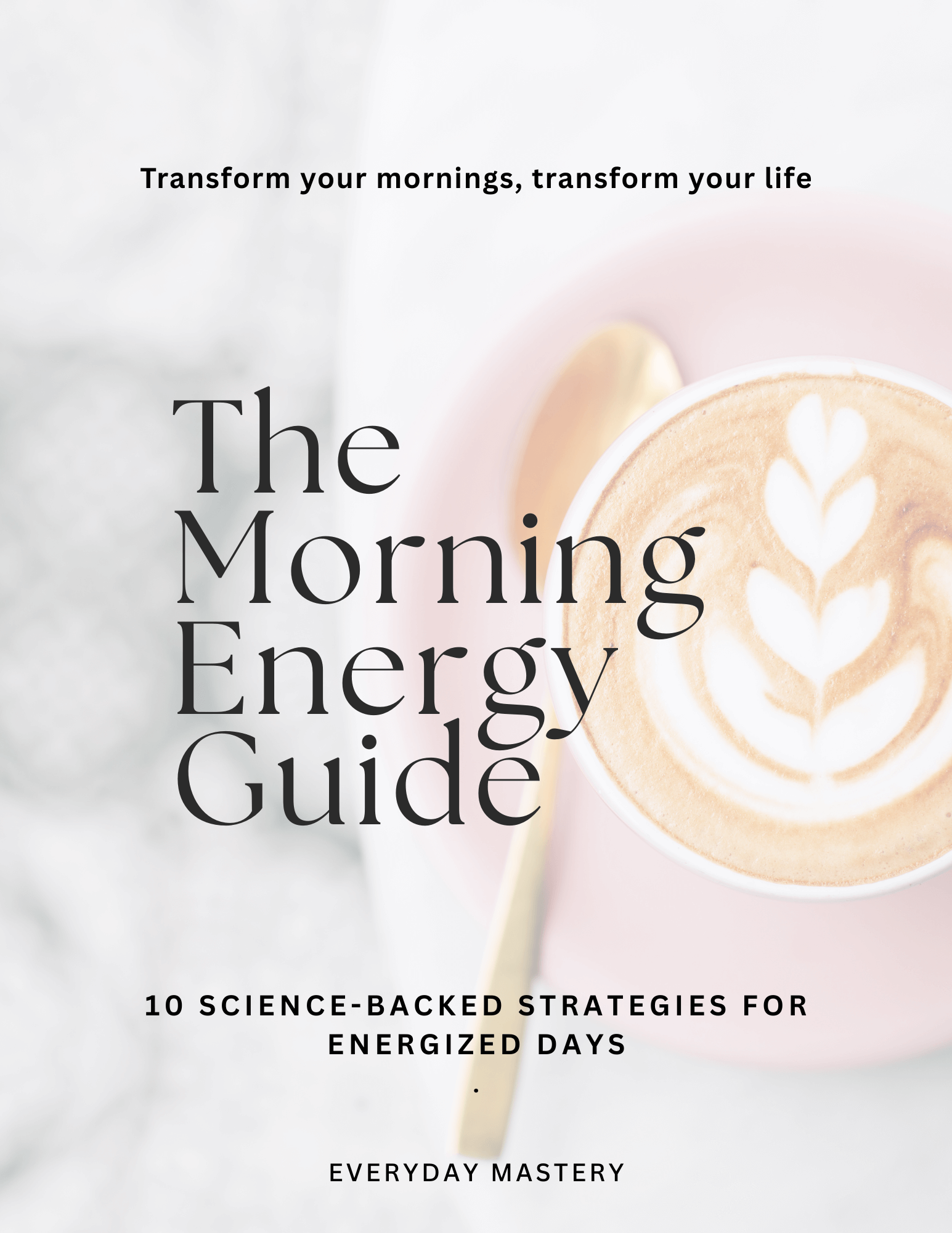By Kelly Harper, Wellness & Life Coach
Last Updated: [Date] | 8 min read
Quick Summary
Hitting snooze five times? Dragging yourself out of bed already defeated? Here’s what’s actually happening: your brain is waiting for a signal. Just 15 minutes of morning activation — simple movement, breath, and light — triggers brain chemicals that boost energy by 20%, reduce fatigue by 65%, and set up your day for success. No gym, no equipment—just your body and one song tomorrow morning. Your only job: Try it once.
The Morning That Changes Everything
Your alarm goes off. You hit snooze. Again. And again.
By the time you actually drag yourself out of bed, you’re already behind, already guilty, already wondering why you can’t just be one of those people who bounces out of bed ready to crush the day.
You shuffle to the kitchen for tea and spend the next hour feeling like you’re moving through molasses or to us UK folk have Brain Fog , scrolling through your phone, feeling worse about yourself with every productivity tip that pops up in your feed.
Sound familiar?
I know it sounds familiar because I lived it for years. Five alarms. Thirty minutes of phone scrolling. Starting every day already behind, already guilty, already exhausted. The worst part? I thought that was just who I was—”not a morning person.”
Then I discovered what was actually happening in my brain, and everything changed.

Here’s what’s actually happening: Your body is waiting for a signal. A trigger that tells your brain “we’re awake, we’re energized, we’re ready.” Without that signal, you’re operating on half-power until caffeine or sheer willpower kicks in hours later.
Research published in Psychotherapy and Psychosomatics (Puetz et al., 2006) found that low-intensity morning movement increased energy by 20% and decreased fatigue by 65% – effects that begin within 5-10 minutes of starting.
Now imagine this instead: Your alarm goes off, you put on your favorite song, and move for just 15 minutes. Suddenly, you feel energized, smile naturally, and stand ready to tackle whatever the day throws at you.
The difference? Simple movement — paired with intentional breath and light exposure, completely transforms your brain chemistry. And the science behind why this works will make you want to start tomorrow morning.
Here’s how it works: The movement itself takes just 5 minutes. The complete routine in the guide is 15 minutes total (movement + other strategies). But tomorrow? Just try one song. That’s it.
Why This Actually Works
Let’s be honest: You’ve tried morning routines before. Instagram-perfect routines with meditation, journaling, ice baths, and people who apparently have 3 hours before work.
You lasted three days. Felt like shit about yourself. Sound familiar?
Here’s why this is different:
Start with just one thing. Tomorrow morning, try movement for 3-5 minutes. Put on one song and move. That’s it. Once you feel the difference, you can add the other strategies from the guide.
It works even when you mess up. Miss a day? Start again tomorrow. Miss a week? Nobody’s keeping score. This isn’t about perfection—it’s about what happens to your brain chemistry when you move, whenever you actually do it. (If building sustainable habits feels impossible, read Why Motivation Fails (And What Actually Works) – it’s the approach that makes habits stick without willpower.)
I know this works because I lived the before and after. I was the person hitting snooze four times, dragging myself out of bed already defeated, spending the first two hours of my day in a fog. Now? I move for 15 minutes, and by the time my tea’s ready, I’m already energized and clear-headed. The difference is so dramatic that on days I skip it, I actually feel the absence.
Over two years of working with clients on morning routines, I’ve seen the same pattern: once people experience the neurochemical shift that happens with just 5 minutes of movement, they can’t imagine starting their day any other way.

What Actually Happens in Your Brain
When you engage in physical movement first thing in the morning, your body triggers a cascade of beneficial chemical reactions that set you up for success all day long.
This isn’t motivational fluff. This is measurable, peer-reviewed neurochemistry.
The 4 Chemical Reactions That Transform Your Day
The 4 Brain Chemicals That Instantly Boost Morning Energy
1. The Endorphin Effect — Your Built-In Mood Booster
You don’t need a marathon. Just a few minutes of movement can flip the switch. Your brain gets the message: “We’re alive. We’re good.” Boom — endorphins kick in, and suddenly you’re not as grumpy as you were five minutes ago.
Even the NHS recognises that short bursts of activity ease stress and anxiety.
One study from the University of Georgia found that low-intensity exercise boosted energy by 20 percent and cut fatigue by 65 percent — not bad for something you can do in your pyjamas.
I tried it one morning, literally just danced around to a Lizzo track while brushing my teeth. Three minutes later, I was grinning like an idiot. It works fast.
“Your body isn’t broken. It just hasn’t been activated yet.”
2. Cortisol Regulation — Less Freak-Out, More Focus
Cortisol (your stress hormone) spikes naturally in the morning — it’s what gets you out of bed. But if it doesn’t regulate properly, it can leave you wired and irritable.
Some movement early on helps smooth that spike. You’re still dealing with messy emails and chaotic school runs — but instead of snapping, you breathe… and somehow, it doesn’t derail your whole morning.
3. BDNF — Brain Growth in Action
Ever heard of BDNF? It’s a brain protein that literally grows and strengthens your neural pathways think of it as Miracle-Gro for your mind.
Moving your body on a regular basis releases this stuff. Research from the British Journal of Sports Medicine found that regular movement reshapes the brain to boost focus and creativity.
As neuroscientist Dr Andrew Huberman puts it:
“Movement primes the brain for learning.”
In other words:
- Clearer thinking
- Faster creative ideas
- Better stress resilience
All for the price of getting off the couch.
4. Oxygen to the Brain — Say Goodbye to Brain Fog
That fuzzy, “I’ve read the same sentence three times” feeling? Usually a sign your brain needs oxygen. A few minutes of movement increases blood flow, brings in oxygen, and suddenly, things click.
You don’t even need coffee. (Okay, maybe still coffee — but less of it.)
Kind of wild, right? Just a few minutes of movement and your brain chemistry literally changes. That’s the power of small wins, that’s Everyday Mastery
For more on how small daily actions compound into major life changes, check out 5 Daily Habits That Transformed My Life – morning movement is just the beginning.
What’s in the Morning Energy Guide?
Movement is where it starts, but the real transformation happens when you combine it with breathwork, light, hydration, and mindset techniques, all designed to activate energy naturally
The complete Morning Energy Guide gives you 10 science-backed strategies that work together to create sustained energy all day:
Strategy #1: The 5-Minute Morning Dance – The movement routine that triggers all these brain chemicals
Plus 9 additional strategies that help you: wake up faster, think clearer, avoid the mid-morning crash, and maintain energy until evening – without relying on caffeine or willpower.
You don’t need all 10 strategies every morning. The guide shows you how to pick 2-3 that work for YOUR life and build from there.
But before you download the guide, try this tomorrow morning: Put on one song you love and just move for 3-5 minutes. That’s it. Feel the difference in your own body first.
Set Yourself Up for Success Tonight
Quick evening prep:
- Lay out comfortable clothes next to your bed
- Put headphones and your playlist beside your alarm
- Place your phone across the room (so you have to get up)
- Choose your movement spot (bedroom, living room, wherever)
The Morning Energy Guide shows you how to prepare the night before so your morning flows effortlessly. (Learn more about designing your environment for success in The Small Habits That Completely Rewired My Life.)
When Life Happens
Miss a day? Start again tomorrow. No guilt, no punishment—just return to the routine. That’s it.
Struggling with making changes stick? How to Overcome Fear of Change explores why starting new habits can feel so uncomfortable – and what to do about it.
Here’s What You’re Doing Tomorrow Morning
Stop reading. We’re done with theory.
Tomorrow morning, you’re becoming someone who moves their body first thing. Just once. Just to see what that version of you feels like.
Your Simple Action Plan:
Tonight:
- Set your alarm 15 minutes earlier (or even just 5 minutes)
- Pick 2-3 songs that make you want to move
- Lay out comfortable clothes
Tomorrow Morning:
- When your alarm goes off, don’t negotiate, hit play and move
- Notice how you feel after
That’s it. Just try it once.

The Promise
Most people feel a lift after just one morning — I know I did.
The research is clear. The benefits are immediate. And the only thing you have to lose is that groggy morning feeling you already hate.
You’re not committing to a 30-day challenge. You’re not signing up for a gym membership. You’re not overhauling your entire life.
You’re just trying movement for one morning, tomorrow.
Get Your Morning Energy Back
After you try it tomorrow and feel the difference, you’ll want to optimize it. That’s where the Morning Energy Guide comes in.
Inside the Free Guide, You’ll Get:
✓ The complete 15-minute routine broken down step-by-step
✓ 10 science-backed energy strategies that work together to create sustained energy from morning to evening
✓ The 4-7-8 energizing breath technique that oxygenates your blood better than caffeine
✓ Evening preparation tips that remove morning friction
Not every strategy will fit your life. Some people love cold showers; others would rather skip mornings entirely. The guide gives you options so you can pick what works for YOU.
Download the Free Morning Energy Guide →
Common Questions
Why do I feel exhausted when I wake up, despite sleeping enough?
Morning exhaustion happens because your brain hasn’t fully transitioned from sleep to wake mode. Your body needs a signal (like movement) to trigger the chemical cascade that brings full alertness. Without it, you’re running on partial power even after 8 hours of sleep.
What if I work night shifts or have a non-traditional schedule?
Do this routine whenever you wake up, regardless of time. If you wake at 4 PM, that’s your morning. Your circadian rhythm still exists—it’s just on a different schedule. The chemical benefits happen whenever you activate your body after sleep.
Can I do this if I have kids who need me immediately when I wake up?
Two options: 1) Wake 15 minutes before them, or 2) Include them! Put on music and move together. They’ll think it’s fun, and you still get the benefits.
I’m not a morning person. Will this actually make me become one?
No, and that’s not the goal. Some people are genuinely night owls. This won’t magically make you love 5 AM. It just makes the mornings you DO have to experience less miserable.
What You’re Doing Right Now
Set your alarm right now. Before you close this tab. Pull out your phone and add 15 minutes to tomorrow’s wake-up time. Or if that feels impossible, just 10 minutes. Or 5.
That’s the only decision you need to make today.
Tomorrow morning, when that alarm goes off, you’ll put on one song and move your body. That’s it. Just once. Just to see what that version of you feels like.
I promise you’ll feel the difference. Not because I’m special—I’m not. It’s just what happens when you give your body the signal it’s been waiting for.
You just have to try it once.
“Motion creates emotion. Every single morning.”
Set that alarm. Right now.
Tomorrow morning, you’ll thank yourself.
Want the complete system? Get your morning energy back with all 10 strategies – it’s free, and it works.
What’s your favourite way to energize your mornings? I’d love to hear about your routine in the comments below!
Kel is the writer behind Everyday Mastery, where she shares the real, messy, and meaningful process of building habits, resilience, and self-belief from the ground up. Her writing blends ancient philosophy with modern science, always focused on small, practical steps that lead to lasting





